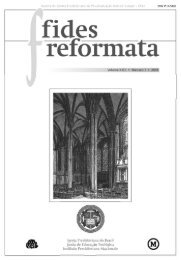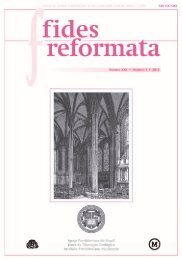Fides 22 N2
Um publicação do Centro Presbiteriano de Pós-graduação Andrew Jumper.
Um publicação do Centro Presbiteriano de Pós-graduação Andrew Jumper.
You also want an ePaper? Increase the reach of your titles
YUMPU automatically turns print PDFs into web optimized ePapers that Google loves.
FIDES REFORMATA XXII, Nº 2 (2017): 139-162<br />
regarding the use of para-church organizations as a substitute for the work of<br />
the local churches is an old one.<br />
Faith and ecclesiology are doctrinal issues that have to be considered in<br />
the light of biblical teaching and exegesis. Warneck, Latourette, Neill, Kane,<br />
Winter, and other mission historians seem to care more for the expansion of<br />
any kind of “Christianity” than for doctrinal truth. The Old Testament prophets,<br />
the Lord Jesus Christ, and his apostles were concerned with the content of the<br />
gospel being spread. Doctrine divides and unites, but the work per se does<br />
not unite. The work must be done according to the teaching of the Scriptures.<br />
Theology matters. Bad theology results in bad strategy and in heretical Christianity.<br />
Strategy is not an independent endeavor that can be designed without<br />
any scriptural and theological judgment.<br />
Winter’s desire and passion to reach out to every “unreached people groups”<br />
and finish the “great commission” by the year 2000 A.D. 89 has never left him.<br />
Winter truly believes that if the contemporary evangelical church lives as it has<br />
been in the United States of America, we will never be able to finish the “great<br />
commission.” There is nothing wrong with such passion in working toward such<br />
goals. The problem is when we began to downplay the work of other brothers in<br />
the past in order to promote a strategic agenda that we have embraced.<br />
2.3.3 Ruth Tucker’s Arguments<br />
In her most read text, From Jerusalem to Irian Jaya: A Biographical<br />
History of Christian Missions, Ruth A. Tucker introduces the Reformation<br />
period and missions with these words: “World-wide missions was not a major<br />
concern of most of the Reformers.” 90 Following this thesis she presents four<br />
main arguments, all of which had already been made, but not documented, by<br />
Herbert Kane. 91 Mission historians’ use of the arguments of previous historians<br />
without even mentioning their names indicates that such arguments are assumed<br />
to be exegeted, documented truths.<br />
The four main arguments used by Tucker are these: Catholic Counter-<br />
-Reformation, lack of overseas opportunities, lack of religious orders, and<br />
the reformers’ theological beliefs – “the imminent return of Christ” (Luther’s<br />
Apocalypticism), the claim that “the Great Commission was binding only on<br />
89 See Ralph Winter’s articles, books, and essays published since Lausanne I, 1974. Winter is a<br />
prolific writer and a hard working brother. He has started, inspired, and supported numerous projects and<br />
movements. See for example the “Perspectives on the World Christian Movement” course; the magazine,<br />
Mission Frontiers (the magazine can be directly accessed through its webpage: http://www.missionfrontiers.<br />
org/); Caleb Project webpage: http://www.calebproject.org/main.php/about_us (Caleb Project produces<br />
the Perspectives courses as well); and the US Center for World Missions--http://www.uscwm.org/.<br />
90 Ruth A. Tucker, From Jerusalem to Irian Jaya: A Biographical History of Christian Missions<br />
(Grand Rapids: Zondervan Publishing House, 1983), 67.<br />
91 See the subheading on Kane in this chapter.<br />
159




